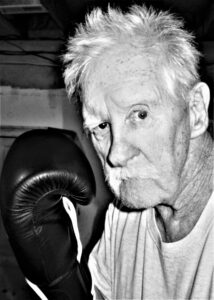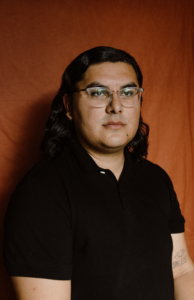04.16.2024
Mourning for What the Western Wilderness has Become: A Review of Red Shuttleworth’s Straight Ahead

Red Shuttleworth
By Jacob Collins
Boxer and poet Red Shuttleworth’s poetry collection, Straight Ahead, transports its readers to the dusty, forgotten landscape of the western wilderness. Shuttleworth captures this landscape on page in vivid detail and colorful words. This is a rocky land full of coyotes, loss, and “sunflower-tinged dying clouds,” where “the rosy curtain of dusk falls on sagebrush, / silent as something buried-by-hand decades ago” and “the sun gouges an irrigated cropland horizon.” When you read Straight Ahead, it is as though you are out west, wilderness all around you and vibrant sky above. You can feel the oppressive sun beating down on you, hear the coyotes howling in the distance, smell the smoke and whiskey.
But Shuttleworth does more than simply describe the landscape in captivating five-line poems. He instills in this collection a sense of mourning for what the western wilderness has become. As urban areas have expanded, the wilderness has been torn apart, broken down until “you can shake / funeral ashes from the pockets of bankers, / realtors, developers: crazy drooling at ranch houses.” Along with this loss of the wilderness comes the loss of youth an innocence, which “gets left behind like coils of rusty barbed wire / on aged-loose, wobbly corral posts.” Shuttleworth doesn’t just describe this mournfulness to his readers, however. He actively puts his readers into the shoes of one who has lost much in their life, telling them “You’re sober these days, clumsy though, / a sun-scorched, one dog-short, thirsty / old man, blood in your glacier-water eyes.” With only a few lines, Shuttleworth manages to convey a whole life of hardship and loss that any reader will feel deep in their bones.
Shuttleworth masterfully evokes images of a beautiful, dying landscape and fills it with a harrowing mournfulness. Even readers who have never had the chance to lay eyes upon the old western wilderness will feel as though they are there. Straight Ahead leaves readers longing for the wilderness, mourning for its loss even if they’ve never properly known it. Through many small glances into this landscape, Shuttleworth paints a grand picture of a land all but forgotten to time.
You can find Straight Ahead and many more poetry collections here.
02.22.2024
In Conversation with Coby-Dillon English
By Jacob Collins
Have you ever wondered what your relationship with someone would be like if you had met them at a different time in your life? Coby-Dillon English explores this idea in their short story, “First Date, Last Night”, which appears in the latest issue of CCR. I had the chance to talk to them about their story’s themes and their writing process.
JC: What was the inspiration behind this story?
CDE: I can’t really pinpoint my inspiration for this piece. Some stories take me a long time, and this was one I wrote over many years. I wrote the initial scene with Leslie’s name over four years ago and then set it aside. Then the form of the continuous first date came to me much later. I am working on a collection of insomnia stories, and for this story, I was thinking about the experience of playing a scene or situation over and over again in your head when you can’t sleep, questioning if you made the right choices, what could have gone differently, etc. That’s where I started with the story, that scene of a first date and that idea of spiraling around the same night, and the rest slowly formed around those two elements.
JC: This story is told in fragments, with sudden jumps into the past and future of Naomi and Leslie’s relationship. What made you choose this style of presenting the story over, say, a more linear one?
CDE: Short answer is because I find that more interesting! Longer answer is that, for me, the timeline in this story is a contradictory one. A lot of the scenes in the present or future are moments I view as possibilities, not exactly hard truths. Certain facets of the first date change, which then change those outcomes. Many of the dates fail, and thus have no future as it pertains to the story. All those possible changes and possible futures become all knotted together and I wanted the story to mirror that feeling.
JC: So much of this story takes place on Thursdays, especially Thursdays in September. What, to you, is the significance of this?
CDE: For the most part, this had a lot to do with setting. I wanted a moment in time to be our marker in this story, either as a sign that we are returning to something or to mark how far we have come. And the setting of Chicago was always clear to me. I was born in Chicago and have lived there in the past, and it is a city and a people that I love deeply. When I think about Chicago, I think of Chicago in the late summer, when it is bright, warm, and social. When I was thinking of a moment in time and space that I wanted to continuously write around, it was Chicago and late summer, and so that certainly influenced that choice.
JC: Names play an important role in this story, between Leslie not liking his name and Robin and Riley having unisex names despite Leslie’s desire to give them masculine names. It’s an interesting theme – what does it tell us about Leslie?
CDE: This is a story about the birth of a family, the various expectations of family making, and for me, gender is a big part of that. I was raised with certain ideas surrounding masculinity, as all people are in some way, and the names in this story were something I could play around with that spoke to those gender expectations. Leslie is a character who, at best, feels murky about who he is, as a man and as a person, and his name was a great way to expose that feeling. His name is a kind of live wire of masculinity that he is constantly being forced to reckon with. When thinking about the sons’ names, I was thinking about how people put a lot of expectations for themselves on their children. Giving his sons unisex names was a way to acknowledge that having sons was not going to save Leslie from the work of figuring out his own character.
JC: There are two scenes in the story in which Naomi seems to give up parts of herself to Leslie, specifically on the train when “Naomi felt two rib bones break off inside, making room for a man like Leslie” and when the two of them are talking about wanting kids and “Naomi plucked two molars from her mouth and offered them up to Leslie in the dim light.” What does this say about the nature of relationships?
CDE: I’m not sure what this says about the nature of all relationships, but for this one in particular, it’s a bit of a willing sacrifice. If Leslie doesn’t know who he is, Naomi doesn’t know what she wants, and she’s willing to give up pieces of herself in order to figure it out. Naomi has the confidence in herself to not lose her entire personhood in a relationship, but she can offer up a piece here and there.
JC: Leslie and Naomi go back and forth a lot in their relationship, constantly separating and coming back together again, but ultimately they stay together in the end. When you started writing this story, did you know what their fates would be?
CDE: Eventually, I did. For a while, the story was just a handful of scenes; I didn’t know what any of it would be. But once I realized the form it wanted to take, the ending was very clear to me. In order to explore the possibilities of who Leslie and Naomi could be to one another, I had to know where they would end up. The harder work was figuring out how we got there.
JC: You’re currently completing an MFA at the University of Virginia. What has that experience been like?
CDE: The worst part is that it is coming to an end soon! I am very grateful to have had the privilege to study literature and writing for the past few years and to do so alongside some incredible writers and scholars. I have deep, deep admiration for my cohort, who are all brilliant, marvelous, and talented people. Literature and people are the most important things in the world to me, and I’ve been lucky enough to spend my time with some spectacular instances of both.
Bios

Coby-Dillon English (they/them) is a writer from the Great Lakes. A member of the Mississippi Band of Choctaw Indians, they are currently an MFA fiction candidate at the University of Virginia. Their writing can be found in Salt Hill Journal, Moon City Review, Yellow Medicine Review, and others.
Jacob Collins is an undergraduate student majoring in English on the Creative Writing track. He says that the best thing about interning at CCR has been reading the wide variety of stories that people from all walks of life submit for publication. Outside of school, he likes reading, writing, and playing D&D with his friends.